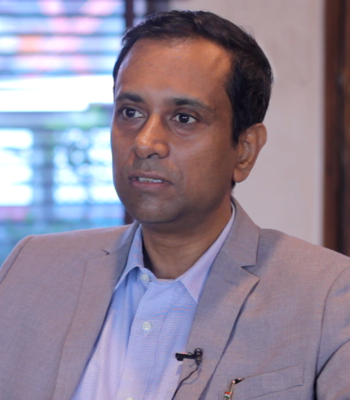Interview with Dr. Rajesh Chakrabarti, Professor and Executive Vice Dean, JGBS
Dr. Rajesh Chakrabarti, Professor and Executive Vice Dean, JGBS has been shaping careers of managers for many years. A highly respected name in Finance, he has taught at University of Alberta, Canada; the Business School of Georgia Tech., Atlanta, USA; and Indian School of Business (ISB). The prolific academic has also held visiting positions at IIM Calcutta; ICN, Nancy, France; Federal Reserve Bank of Atlanta and other institutions. A PGDM from IIM Ahmedabad and Ph.D. from University of California, Los Angeles, he has authored or edited nine books and has several book chapters and articles in leading scholarly journals to his name.
As a columnist for The Financial Express; former Executive Vice President, Research and Policy at the Wadhwani Foundation; and a co-founder of the policy advisory start-up, Sunay Policy Advisory, he wears many hats. Talking about his passion for Finance, here he shares with us his thoughts on developing expertise in the field and imparting knowledge to future managers.
Q: To start with the early years, how did you develop your passion for Finance and how was it nurtured?
A: My background is in Economics, which I studied at Presidency College (now Presidency University), Kolkata. Given the highly politicized environment there, I naturally developed an interest in Public Policy early on, as Economics is also closely associated with Policy. However, when I did my post graduation from IIM Ahmedabad, my favourite subject was Organizational Behaviour. Anyway, I worked with Industrial Finance Corporation of India for a year, before moving to the US to pursue Ph.D. It was here that I came in close contact with Professor Richard Roll, one of the foremost scholars in Finance and a protégé of Nobel Laureate Eugene Fama. He became by advisor and it fuelled my passion for Finance, which translated into the longstanding relationship with the subject.
Q: From studying Finance to teaching the subject to students in different parts of the world, how did that transition happen?
A: After completing Ph.D. from UCLA, I started working as an academic 18 years back at University of Alberta, Canada. It was a cold but gorgeous city to live in. Then I went to teach at Business School of Georgia Tech., US for about 7 years. I returned to India in 2007 and taught Finance at ISB, Hyderabad and Mohali for 8 years. With ISB I had the opportunity to become the first Executive Director of the Bhartiya Institute of Public Policy. The change to non-academic role further led me to Wadhwani Foundation to work on a think tank on Public Policy. But I missed teaching. So I came to JGBS.
Q: Teaching Finance can be tricky, especially since many students find it tedious. What are your strategies to make classroom learning engaging?
A: I agree Finance can seem abstract and technical, but, if a teacher makes an attempt to turn it into an analytical, quantitative subject pointing out its implications, students usually begin to love it. I try to connect Finance questions to the students’ day to day experiences to help them relate to the concepts. When they can make that connection with their experiences or of their parents’ and friends’, they get the true essence of the subject. I remember one of my own teachers at IIM Ahmedabad, Prof. S.P. Singh, who would almost theatrically perform the examples in the classroom. That took our interest in the subject to a whole new level. Those were the most memorable sessions for me.
Q: What according to you are the things that JGBS does differently that makes it a cut above the rest?
A: The biggest strength of Jindal Global Business School is that it is situated in a University. Today, to be a successful manager, you have to go beyond the knowledge of subjects like Finance and HR. Management education has become much broader and you need to understand subjects like Public Policy and Law. It is seen that a major part of running a successful business involves dealing with government agencies and policies. Being part of the University, students at JGBS not only have access to management professors but also experts in Law, Media, Public Policy, and other disciplines. Other B-Schools, being mostly standalone institutes, can’t offer this advantage to management aspirants.
Q: Finally, do you have a mantra that you may have followed in your professional journey?
A: There is a very famous prayer, “Give me the Courage to change what I can, Patience to bear what I cannot, and Wisdom to know the difference.” I always found this a good talisman to carry with me.

